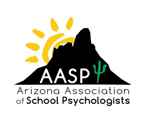 |
AASP's Advocacy Initiative
On behalf of our members, AASP promotes the school psychology profession through a continuum of grassroots efforts, collaborations, and coalitions. We encourage AASP members to regularly communicate with your elected and appointed AASP Executive Board members. Your stories, challenges, and successes assist us to advance our comprehensive practice model and provide PK12 students with greater access to school psychologists in Arizona schools. We also encourage our members to follow AASP through social media and communications, as well as respond to letter writing campaigns and messaging to legislators and other decision-makers.
Key Advocacy Priorities
- Address shortages of school psychologists
- Support effective school safety measures
- Increase access to mental health services in schools
- Increase investment in education
- Promote equity for all students
- Advance the Comprehensive Role of School Psychologists
What is advocacy?
Advocacy encompasses a continuum of activities for the purpose of influencing stakeholders. Advocacy focuses on building relationships, creating partnerships, educating the public, and developing leadership. AASP Advocacy committees inform policy and law makers at the federal, state and local level on initiatives that support children, youth, and families in our schools and communities.
Public policy advocacy is a process of engaging with stakeholders to propose, negotiate, and advance recommendations with key stakeholders.
Legislative advocacy refers to efforts to influence the introduction, enactment, or modification of legislation. (NASP Policy Playbook, 2019, p. 15).
Advocacy efforts may also target local stakeholders (e.g., school board members, superintendents, community leaders) by educating them on important issues and forming coalitions to support critical initiatives.
AASP partners with NASP to advance advocacy work at the national, state, and local level.
How can you get involved in advocacy?
-
Share a story about how you successfully advocated for an issue at the student, school or district level.
-
Come to an Advocacy in Minutes presentation (add AIM to events calendar and link to them here)
-
Share a story about how you promoted awareness about the field of school psychology as part of National School Psychology Week or throughout the year.
-
Present to high school students about the field of school psychology using the NASP Exposure Project materials.
Donate to AASP advocacy efforts through our Contribution Form.
Then tell us what you have been doing so that we can recognize and celebrate your efforts! No action is too small we want to hear it all!
Child and Family Advocacy Committee
The Child and Family Advocacy committee (CFA) is comprised of board members as well as members at large. Current committee chairs: Marsha Spencer and Shannon Morse
What do we do?
-
We build members’ capacity to advocate individually and collectively at the school, district, state, and national level to further the AASP vision “for all children and youth to thrive in schools and communities, by promoting equity and excellence in educational and mental health practices” (AASP Vision Statement)
Public Policy Advocacy Committee The Public Policy Advocacy committee (PPAC) is appointed by the AASP President and works closely with the AASP Public Policy Liaison, Susie Cannata, to provide data and accurate information to Arizona legislators and other policymakers. The Arizona Department of Education Liaison collaborates with ADE directors and staff on school psychology practice issues. The NASP Delegate and NASP Government and Professional Relations Liaison coordinate national and state efforts to increase access to comprehensive school psychological services. Current Committee Chairs: Stacy Anderson and Marsha Spencer What do we do? We promote legislative and policy initiatives through conversations with these stakeholders:
|
Public Policy Liaison
Susie Cannata is a lawyer with Peters, Cannata and Moody. She advocates for and supports organizations that focus on the well-being of children and individuals with disabilities.
How does public policy liaison help AASP?
The Arizona Association of School Psychologists (AASP) Public Policy Liaison facilitates AASP’s state legislative agenda as determined through the AASP Executive Board, Public Policy Advocacy Priorities, and Child and Family Advocacy Strategic Plan. The Public Policy Liaison advocates for AASP priorities with elected officials and their staff, as well as any other relevant agencies and their staff.